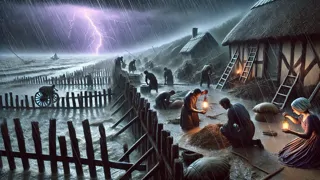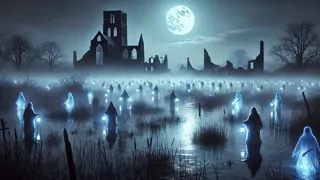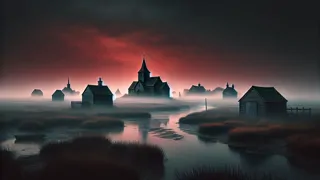Introduction
In the wind-swept reaches of eastern England, where the lonely salt marshes meet the churning North Sea, an age-old warning rests in the song of sea birds and the whisper of the tide. They say that long ago, when the moon was waning and storms gathered like dark omens on the horizon, entire villages vanished in a single night. Salt water claimed fields once heavy with barley, and humble cottages crumbled beneath the relentless push of waves. The stones of church steeples, once sturdy bastions of faith, sat half-submerged in tide pools that glimmered like glass beneath a blood-red dusk. In hushed tones, fishermen and farmers speak of the Sunken Lands, a realm lost between memory and nightmare, where the sea reigns supreme and the living dare not tread after dusk. For each rising tide brings reminders of villages swallowed by water and dreams left adrift on midnight currents. It is a tale passed down from hearth to hearth, a story of grief and respect, urging all who listen to honor the fragile balance between land and sea. As we stand on these shifting shores today, the ancient lament echoes with renewed urgency, warning that the boundary we take for granted may vanish beyond our sight when we least expect it. Generations before, our forebears built dikes and drainage mills by sweat and faith, convinced they could tame the restless waves. Yet as sea walls crumbled and salt crept into fresh wells, they learned that nature's might could never be fully contained. Across mist-laden fields, the old names still linger in memory—Halcyon, Dorchester, Willowmarsh—whispered with sorrow by those who see ghostly outlines of rooftops beneath rippling currents. Our story begins at the hinge of that world, where earth and ocean collide, and where one family will face the ancient warnings that time nearly buried.
The Gathering Storm
As dusk settled over the coastal fields, a restless hush fell across the village of Willowmarsh. Dark clouds gathered on the horizon, their underbellies tinged with bruised purple and ash, as though the sky itself bore a wound. Fisherfolk paused in their chores, noting the tide’s slow but certain creep toward the farmsteads that once felt safe. Gull cries cut through the salty air, sharp reminders of the sea’s claim on their lands. Old timers exchanged nervous glances by the harbor, recalling half-forgotten tales of ancestral warnings. In every whispered story, the rising waters heralded a reckoning that no mortal hand could withstand. Children clung to their mothers’ skirts as wind gusts rattled wooden shutters. The smell of seaweed and brine hung heavy, dampening even the bravest spirits. Cattle in the low pasture shifted uneasily, their hooves sinking into the soggy earth. Elders spoke in solemn tones of breaking dikes and failing sluices, convinced the hand of fate was at work. Lanterns flickered in that growing gloom, as if the faint glow could ward off the coming tide. All around, the village braced itself for an uncertain night.

By midnight, the sky fractured with lances of lightning that illuminated the marsh in stark relief. Rain thrashed the low wooden huts, turning pathways into tenuous canals that reflected the flashes above. Salt water gushed through breaches in the earthen walls built by long-gone masons, seeping into fresh springs and brackish wells alike. Farmers scrambled to pile sandbags around their doorways, hands trembling as they worked. The relentless roar of waves masked the desperate shouts of laboring villagers, united in a battle they never sought. Some whispered that the sea had grown jealous of the lands it could not claim, rising with calculated malice. The church bell tolled in warning, its peals swallowed by the storm’s power. In the chaos, families huddled together, murmuring prayers to saints unknown and gods unloved. Horses bellowed in soaked stalls, flanks slick with rain, eyes wide with fear. Reed huts teetered as torrents battered their thatched roofs. Through all the tumult, the tide’s cold fingers probed deeper, swallowing fields like hungry jaws. No cry went unheard beneath that furious sky.
At dawn’s first gray light, the storm’s fury retreated into mourning clouds that trailed fine streams of rain. Villagers ventured out, boots squelching in mud thick with salt and fallen reeds. Where golden barley swayed the day before, only brine-soaked stubble remained, bowed beneath the weight of destruction. The masonry of lock gates lay broken, its stone faces scored by water’s wrath. A pall of disbelief hung over the survivors as they surveyed the damage. The air tasted of regret and loss, heavy with tears yet unshed. In the heart of the breach, the old dike lay shattered, its bones exposed to the indifferent sky. Children peered into shallow pools where fish flopped in their final moments. Husbands supported weeping wives as they stumbled from ruined cottages, grasping only what they could carry. The elder woman, known as Isolda the Wise, walked slowly along the broken embankment, her staff cutting small divots in the collapsing earth. She muttered words of ancient power, hoping to soothe the restless sea before it returned in vengeance.
Over the next days, neighbors pulled together to salvage what could be saved from the half-submerged homes. Crates of salted pork and dried grain were passed hand to hand, unified supply lines forged by desperation. Children gathered driftwood and bits of rope, building crude rafts as if mocking the waters that had once carried their loss. Young men and women dug trenches to redirect the receding floods, guided by Isolda’s firm instructions. Everywhere the song of hammers and saws rose, an uneasy hymn desperate to rebuild what nature had torn away. Rumors swirled that the breach had been more than an accident, that some dark pact or curse had summoned the sea with cruel intention. Yet no blade could be found to slay such an elusive foe, no prayer powerful enough to turn back the tide. As the villagers labored, tales of ghostly lanterns floating across the marsh at twilight grew louder. The watchers by the water’s edge spoke of lantern flame dancing above ruins long gone. Each sighting stoked fear that the lost voices of Halcyon and Dorchester still sought to call the living into their brine-soaked tombs. At night, the wind carried voices impossible to decipher, like distant chorales sung in unfamiliar tongues.
By the end of the second week, the makeshift barricades held, but only just. The fields lay barren, their rich soil leached of nutrients by unkind tides. From the heart of the village, damaged walls and shutterless windows told a story of lives upended. Yet beneath the sorrow, a fierce determination took root. Villagers gathered to offer thanks for their survival and to seek guidance for the future. In a gathering by candlelight, Isolda spoke of ancient bonds between land and sea, treaties signed in ritual and blood that demanded respect in every rising tide. She warned that if those bonds were broken—by pride, greed, or neglect—the sea would reclaim its dominion without mercy. The gathered crowd listened in rapt silence, their faces lit by flickering flame and tinged with newfound resolve. They swore to rebuild stronger, to honor the water’s presence as both giver and taker. With prayer and perseverance, they would ensure that the tale of Willowmarsh became one of caution and strength, a legacy to guide generations yet unborn. And as dawn broke, the first true sunlight in days offered a fragile promise that balance might be restored.
Whispers in the Deep
Years passed since Willowmarsh’s breach, but the tale of submerged settlements refused to fade. In the neighboring hamlet of Dorchester-on-Sea, a hushed rumor pulsed beneath everyday life: that beneath calm waters lay relics too precious to sink beneath oblivion. It was Margot’s keen eye that first detected the glimmer of carved stone protruding through the shallows. She and her father, Tomas the boatwright, rowed small skiffs into the shallow bay at dawn. There in the reedy shallows, fish fled from their nets as though spooked by an unseen force. Margot’s fingers traced ancient symbols worn by time, uncovering a sealed casket half-buried in silt. The air around them seemed to hum with unspoken promise and dread. Tomas, weathered by salt and labor, felt his pulse quicken with equal measures of fear and wonder. He recalled the elder’s words, cautioning that some treasures awaken storm-fed hunger. Together, they hauled the casket into the boat, its timber edges slick with brine. As the sun’s first rays touched its surface, the recovery felt both a blessing and a summons to darker truths yet unspoken in the realm of men.

Once ashore, scholars from the local abbey examined the casket with candlelight and whispered prayers. Its lid bore carvings of villages swallowed by waves and figures reaching from foam to guide the living below. Within, scrolls of parchment curled with dampness, ink blurred by centuries beneath saltwater. Margot carefully unrolled them on a wooden plank, revealing maps of sunken streets and verse that spoke of a pact sealed by ancestral blood. Tomas watched helplessly as words took form in his daughter’s wide, haunted eyes. One verse spoke of a tide that would rise three times higher than ever known, reclaiming every stone along the coast. The parchment ended with a plea to honor the ancient covenant, lest the sea’s hunger grow insatiable. Intrigued monks debated whether the scroll was relic or omen. The village constable advised discretion, fearing panic among folk who still lived in simple cottages above the marsh. Yet Margot and her father carried the unease of the scroll into every conversation, their thoughts echoing with each crashing wave.
Days turned to weeks as the news spread quietly among township elders and visiting clergy. Dorchester’s port council, led by Lord Huxley, dismissed the find as superstition unworthy of attention. He proclaimed the coastline secure, boasting of new sluices and dikes stronger than ever before. His words reassured merchants who depended on safe passage for trade in wool and salted herring. But at night, Margot heard voices carried on the breeze, voices luring her toward the moonlit waters. Tomas woke to find her gone, boat oars already wet with brine. He searched the banks, praying that the ancient tide had not claimed his only child. The villagers whispered that some bonds between parent and child were tested on tides both physical and spiritual. In the abbey’s cloistered halls, candle wax dripped as monks debated whether to secure the parchment or bury it anew beneath layers of stone. All the while, the sea murmured, promising both revelation and ruin to those who dared listen.
Driven by a mix of dread and devotion, Tomas and Margot prepared for a final journey beyond the shallow bay. They gathered lanterns, dried fish, and prayer beads etched with symbols from the scroll. With moonlight guiding their path, they slipped into a hidden cove where barnacles clung to barn doors of long-submerged stables. In that eerie half-world, the brine shimmered with pale phosphorescence, lighting a trail toward the shattered remains of a church tower. Margot felt her heartbeat echo in her ears as she placed a hand on the cold stone, whispering the sacred verse from memory. The air trembled, and the tide paused in its rise, as though nature hesitated at her command. Tomas knelt beside her, voice rough with emotion, seeking mercy for the misguided souls who once broke the covenant. They invoked the old names—Halcyon, Willowmarsh, Dorchester—calling them home with solemn prayers that carried across watery streets. There, in the silent ruins, they hoped to forge a new pact that would honor both living and lost, sealing a promise between land and sea beneath the watchful gaze of moon and stars.
Echoes of the Lost
Months unfolded as Dorchester-on-Sea transformed under the weight of revelation. Villagers, once skeptical, now labored side by side to raise embankments and reinforce sluice gates. Women wove thick ropes from reeds, while children carried baskets loaded with plaster and nails. Tomas oversaw repairs to the workshop walls, his mind never far from the parchment’s warning. Margot charted the high water marks on hastily painted boards, her nimble fingers marking each harrowing crest. Monks from the abbey offered blessings, chanting psalms at every corner where the stones had cracked. Even Lord Huxley, driven by both fear and curiosity, donned workman’s garb to wield a hammer in solidarity. The air grew thick with salt spray and the scent of fresh timber as every soul gave what they could. For the first time, unity bound the hamlet against the sea’s ancient claim, forging hope from shared purpose. Each act of rebuilding felt like an offering, a tangible plea for mercy from the restless waters.

But as the work progressed, strange sightings—echoes of the lost—began to stir. At the full moon’s height, luminous figures drifted across the marsh, outlines of roofs and chimneys appearing in shimmering lines. Villagers glimpsed shadowed silhouettes of processions, silent pilgrims treading paths submerged for centuries. Some swore they heard distant hymns carried on the wind, vocals as pure as laughter yet tinged with mourning. Margot listened at the water’s edge, heart tight with longing for a realm she never knew. Tomas found footprints in damp sand leading toward the drowned lane known as Mariners’ Gate. Lords and peasants alike paused in their labors, unified again by awe and apprehension. The abbey’s bell tower tolled long into the night, its deep tone a summons to witness and remember. These apparitions, fleeting as foam, reminded all that the sea harbored more than salt and fish—it carried echoes of lives that once thrived upon the sands. In bowing to those echoes, the living pledged remembrance and respect.
In a grand ceremony held beneath flickering torchlight, the village gathered to renew the ancient covenant. A long table was laden with bread and salted fish, symbols of earth’s bounty and the sea’s generosity. Margot read aloud the verses of the recovered scroll, her voice steady despite the hum of unseen listeners. Tomas poured fresh water into a shallow basin, carrying cups crafted from driftwood and bone. As family members drank in turn, they vowed to honor the deep in seasons of bounty and hardship alike. Elders offered sprigs of wild thyme and heather, scattering them at the waterline as tokens of lasting peace. Monks consecrated the ritual with incense plumes that rose above the crowd, mingling smoke and salt air. Even the sea seemed to hold its breath, waiting to see if mortals could uphold the fragile promise they made. Once the rite concluded, a calm descended, as if the pact had been heard by unseen ears beneath the waves. For the first time in generations, land and sea stood in balanced harmony under the watchful stars.
Seasons changed, and the tides respected the new accord—until one dawn when the horizon blushed with unnatural light. Margot woke to a hush suspiciously absent of gull cries. Tomas, alerted by a tremor through the floorboards, guided her to the window just as a swell rose like a wall of glass. The repaired sluices held firm, diverting the mightiest surge, but the marshland beyond lay drowned once more. The villagers rallied, their combined strength echoing the memory of their ancestors’ labors. Where once fear might have shattered resolve, gratitude and unity found renewed vigor. In that moment, they understood that the covenant was not a one-time safeguard but a living bond demanding continual respect and renewal. As the sun’s first warmth kissed the wet earth, Margot stepped forward into a world reshaped by both peril and promise. The Echoes of the Lost receded into stillness, content that their voices had been both heard and heeded. And in the silence that followed, a single seagull soared skyward, carrying the song of warning from one generation to the next.
Conclusion
As time flowed onward, the shores of Dorchester-on-Sea became both a living memorial and a testament to human tenacity. Where once fear of the Sunken Lands stilled hearts, now the hammer’s ring and the hymn’s echo spoke of unity and profound respect for the natural world. The village’s dikes and sluices stood as silent guardians, reminders that the sea’s gifts must never be taken for granted. Children grew up learning the verses that Margot once read beneath torchlight, their voices weaving new layers into an ever-evolving covenant. Travelers who arrived by barter or pilgrimage found a community shaped not only by stone and timber but by the power of ancient pacts renewed. And on nights when moonlight traced silver paths through marsh reeds, villagers paused to listen for soft whispers beneath the tide, remembering those who slumbered beneath the waves. Even now, coastal keepers maintain shrines at the water’s edge, offering salt-scented wreaths and songs carried on the breeze to appease unseen guardians. Scholars debate the origins of the pact, yet all agree on its enduring truth: land shaped by water demands vigilance, humility, and an open heart. Thus, in every stone laid and every barrier raised, there is an unspoken prayer—an echo of voices lost beneath the sea and a promise that their memory will guide the living until the end of days.



















